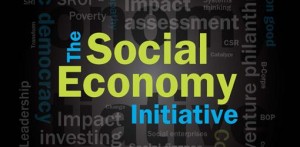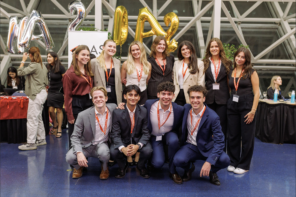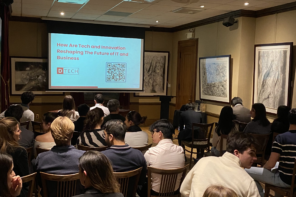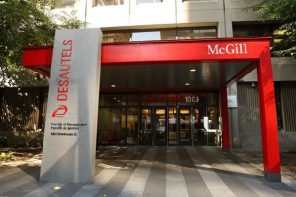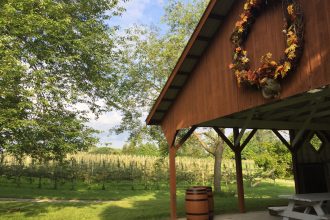On Friday, the Social Economy Initiative (SEI) presented its Second Annual Homecoming Keynote event in the Bronfman Building. The event featured presentations from five social entrepreneurships including Aspire– the 2013 Hult Prize winning team, as well as four past winners of the McGill Dobson Cup. Each team elaborated on their companies and the ways in which their work has had an impact.
The first presentation was made by Street Suds, the winning team of the 2011 Dobson Cup. The founding members recognized how difficult it can be for the homeless to re-integrate into society. As a result, they developed Street Suds as a laundry service with an employment program designed to assist homeless people transition into the workforce and develop a sustainable lifestyle. The one-year program hires employees for part-time work washing and delivering laundry. Employees learn business skills and are given opportunities for personal development, while learning valuable life skills.
The second presentation was made by World Wide Hearing, the 2012 Dobson Cup winner. World Wide Hearing is a non-profit that provides hearing aids to youths in developing countries. World Wide Hearing aims to combat the serious consequences of hearing loss such as poor school performance. World Wide Hearing enables children in developing countries to attend school, find work, and give back to their community.
The next presentation was made by Decode Global, the 2013 Dobson Cup winner. The company designs video games on the theme of social issues, most notably “Get Water!” for iOS. The game follows Maya, a young Indian girl, who loves school but cannot attend because she must get water for her family. Half of all proceeds from in-app purchases go to charity: water, an organization with a mission of bringing clean, safe, and accessible drinking water to everyone in the world. Decode Global also offers fellowships to humanitarian technologists.
The fourth presentation was made by Sanitru. Sanitru is a team of two current McGill students Jessica Wang, U3 Psychology and International Development, and Jassi Pannu, U3 Biology. Their mission is to reduce the incidence of wrong drug errors made by nurses and doctors in hospitals. At the Dobson Cup, Wang and Pannu pitched a bottle cap system that would help hospital staff to quickly and accurately identify the drugs to be administered. However, after more research they found that this system would not be as effective as they hoped. Now, they are working on creating a smartphone app that would empower the patient and hopefully help the patient to reduce wrong drug errors. The app will provide patients a step-by-step guide for navigating their hospital experience.
The fifth and final presentation was given by Aspire, the winners of last year’s Hult Prize. Team members Gabriel Mott and Jesse Pearlstein gave the presentation that won the team $1 million at the Clinton Global Initiative Conference in September. Aspire uses the sustainable farming of crickets in rural areas to bring affordable and nutritious food to urban slums in developing areas. So far, the team has businesses in Thailand, Kenya, and Mexico. A question-and-answer session followed Aspire’s presentation.
“The conference was very well put-together and engaging,” enthused Jane Zhang, U3 Sustainability, Science and Society. “I learned about the Dobson Cup and the SEI program, both of which sound very appealing to me as a sustainability student wanting to apply my skills and knowledge into action. The presentation got me thinking about initiatives that are both environmentally and socially responsible as well as financially feasible.”

